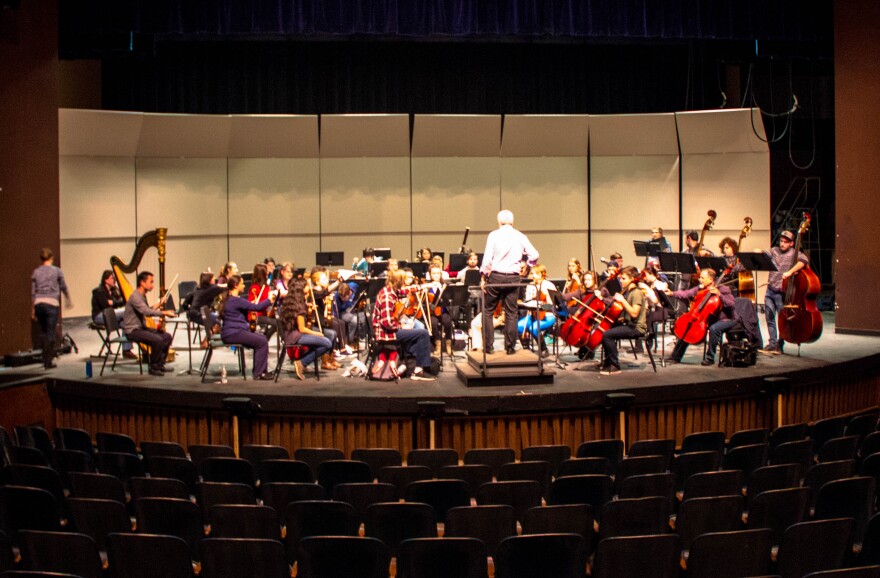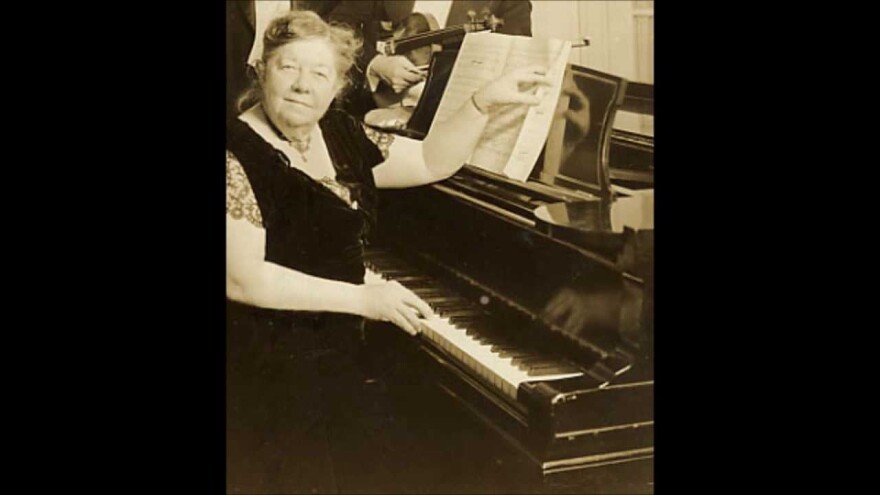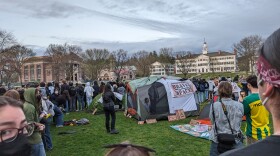Composer Amy Beach was born in Henniker in 1867. By the time she was 29 she was famous the world over for being the first American woman to write a symphony.
To celebrate the 150th anniversary of her birth, the University of New Hampshire has been honoring Amy Beach with a series of special performances. NHPR’s Sean Hurley recently visited the school to learn more about the composer - and her music.
As two student pianists rehearse Amy Beach’s piano duet “The Brownies” across the hall from her office, UNH Music Professor Peggy Vagts begins to tell me about the composer. “Beach was born in Henniker. She was an only child,” Vagts says. “Her mother says when she was not two years old yet her mother would be singing a hymn or something and she would harmonize.”

But, despite knowing Amy had a special relationship to music, Vagts says, “Her mother in particular had a philosophy of not allowing the child to indulge every wish or whim early. So she denied her touching the piano or playing the piano.”
And so Amy Beach began to play it in her head. “She went to her grandparents farm in the summer. And while she was there she - in her head - wrote some piano waltzes,” Vagts says.
“She came home and she told her mother that she'd made some waltzes and her mother said, ‘Well there's no piano there, you couldn't have done it.’ She said, oh she did it in her head. And then sat down at the piano and played them.”
Amy Beach was four years old. “And at some point her aunt came visiting from San Francisco and said ‘This is ridiculous. Let her play the piano,’” Vagts says, “so then her mother started giving her lessons. So she got three short piano lessons a week.”

Amy Beach associated music with colors. The rain reminded her of different songs. “If her parents wanted to punish her when she was a child they'd play something sad on the piano and she'd cry,” Vagts says.
Usually the punishment was Louis Gottshalk’s Last Hope.
“She made her debut with the Boston Symphony when she was 16 playing concerto with them when her parents finally allowed her to perform in public,” Peggy Vagts says. “I think left to her own devices she would have been a performing pianist.”

But at the age of 18, Amy met, and soon married, the wealthy – and considerably older - Dr. HHA Beach. “I mean what he wanted her to do was compose,” Vagts says. “He was fixated on it.”
And so Amy Beach began to work on her Mass in E Flat Major. “Just a huge undertaking,” Vagts says, “And that's the first thing she did. It was premiered by the Handel and Haydn Society.”
It was 1889 - Beach was 22 years old. “She was really almost completely self-trained,” Vagts says. “She would study everything that that the Boston Symphony performed for example. She'd go home and she try to write it all down. Then she'd study the way the composer had done it. She translated from the original French Berlioz's Book on Orchestration so that she could study orchestration in that way. She never learned to cook in her life. She never did house wife duties, never learned to drive and no sort of practical abilities.”
Couldn’t cook or drive - but she could write an opera - as students Kate Curtis and Zach Hartrich tell me as they sing and discuss Beach’s lone opera Cabildo.

“It's a really great opera because it's wicked accessible because it's in English and it's about pirates and ghosts and romance,” Curtis says, “Like I wasn't afraid to tell people like anybody to come to it. Oh and it's short!”
“It's only forty five minutes,” Hartrich says.
“Yeah, a short pirate opera!” Curtis says.
“It's probably as good as operas get,” Hartrich adds.
In the UNH recital hall, student orchestra bassoonist Nick Pitcher plays an A note –and the rest of the orchestra tunes to him before playing Beach’s Bal Masque’.

A tricky piece, Pitcher says. “The melody is written lightly and the accompaniment is written heavy," he says, "so we had a lot of troubles with that when we were going through really knowing who had the melody where and what to bring out and stuff.”
The difficulty with Bal Masque’, Peggy Vagts tells me, is that Beach wrote it originally as a piano piece –she only later orchestrated it to prepare herself for writing the Gaelic Symphony - the first ever symphony written by an American woman.
Although Amy Beach spent her young childhood in New Hampshire- and most of her adult life in Boston and New York - she did spend 20 summers at the McDowell Colony in Peterborough. She voted here, she maintained her residency here – and frequently returned to visit one of the many Beach Clubs in the state - to play and talk about music, often, as Peggy Vagts tells me, with children.

“And this is a letter written to the Etude Magazine by a little girl named Lizabelle Gay who was from the Beach Club in Wolfeboro,” Vagts says and begins to read, "There are nearly 30 members in all - most of us are under 12 years of age. When Mrs. Beach plays she lets us all stand around her. We wish all children could have a Beach Club and of course they can. But there is only one Mrs. Beach and she belongs to us."
And she still does.
Virtually visit UNH's online Amy Beach Exhibit, "A Brilliant Life."







